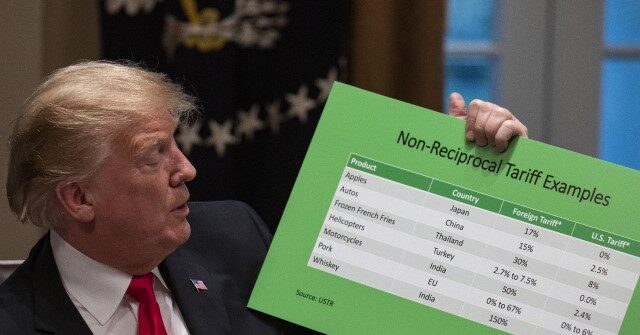Recent swing state polls conducted by BSG and GS Strategy Group reveal that voters trust former President Donald Trump more than Vice President Kamala Harris on issues related to international trade and tariffs. This data highlights Trump’s economic agenda, which appears to resonate well with swing state voters who are currently experiencing wage pressures amidst rising costs attributed to the Biden-Harris administration. Reports indicate that prices have surged by an average of 20 percent since the current administration took office. The trust margin between Trump and Harris stands at three percentage points (48% to 45%), with a notable 7% of voters stating they trust both candidates equally. This polling was conducted among a sample of 2,941 voters across key swing states including Arizona, Georgia, Michigan, Nevada, North Carolina, Pennsylvania, and Wisconsin from September 19 to 25, though the margin of error was not disclosed.
The polling results reflect a broader sentiment among Americans, as previous surveys indicate majority support for tariffs despite prevailing opposition from political elites and mainstream media. Trump’s economic proposals aim to address these concerns with robust strategies. Among his key proposals is the introduction of Universal Baseline Tariffs, designed to replace the current Biden administration’s policies that are seen as punitive towards domestic producers while favoring outsourced goods. This new system intends to foster domestic production by imposing taxes on foreign companies, thereby establishing a more favorable environment for American workers.
Additionally, Trump advocates for the complete elimination of U.S. reliance on China, which he argues is a primary beneficiary of the Democrats’ globalist agenda. These proposals have gained traction among voters who are increasingly concerned about the implications of foreign dependence on domestic job markets. The issue of tariffs has long been a critical topic in American economic history, serving as a tool to generate federal revenue and encourage domestic production by providing a protective barrier against foreign competition. Such tariffs had fluctuated significantly over the years, reaching as high as 60 percent before dropping to approximately 20 percent by the mid-19th century.
From 1861 to 1933, tariffs averaged around 50 percent, reflecting shifting economic policies. However, since 1934, the average tariff has significantly decreased to about 5 percent, largely due to the emergence of the “free trade” ideology. Despite its widespread acceptance, some economists critically label free trade as an idea primarily benefiting global elites, with a consequential impact on domestic job markets and industries. The Trump administration marked a turning point for tariffs and trade policy in the United States, reigniting discussions on the importance of protecting American production and job opportunities.
Trump’s ascendance in the trade debate has revived the long-dormant issue of tariffs, which had been sidelined prior to his 2016 campaign. His America First policies resonated with voters seeking a return to prioritizing domestic economic interests over global trade agreements. The sentiment in swing states, highlighting preference for Trump’s approach, suggests a growing discomfort among voters regarding the effects of unregulated global trade on their livelihoods. As the political landscape evolves, the dynamics of these debates will likely continue to influence voter sentiment and policy direction.
In conclusion, Trump’s trade and tariff proposals capitalize on growing public discontent with international economic policies under the current administration. With swing state voters expressing greater trust in his approach, the implications for both domestic production and foreign relations are significant. As the historical context of tariff debates illustrates, the issues surrounding international trade are deeply rooted in American policy discourse, and current economic pressures could lead to a resurgence of protectionist sentiments in the near future.

